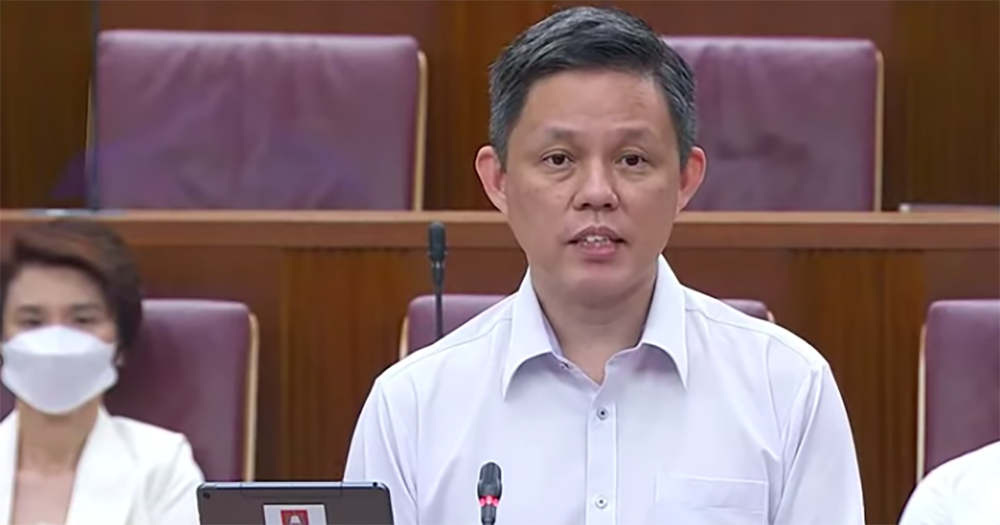Follow us on Telegram for the latest updates: https://t.me/mothershipsg
The Ministry of Education (MOE) provides post-diagnosis educational guidance to render emotional assistance and guidance to parents of children with special needs, Education Minister Chan Chun Sing said in Parliament on Feb. 14.
These include teachers working closely with parents whose children are in Special Education (SPED) schools, to exchange information on their children's progress, as well as having a social worker at each school who can provided additional emotional or financial support to families.
Chan was responding to several questions raised in Parliament about the provision of additional support to caregivers of children with special needs, in relation to the case of a man who was charged for the murder of his 11-year-old sons with special needs.
For example, Member of Parliament Denise Phua asked, "To ask the Minister for Education in view of the recent death of the twins in Upper Bukit Timah, what lessons can be learnt on the protection of children with special needs and the guidance and support for caregivers, at the national, community and family levels."
Around 27,000 students with mild special needs attend mainstream schools
In addition to the SPED schools, there are also Special Student Care Centres which provide before and after-school care services for children with special needs, Chan said.
There is also SG Enable, a government-linked agency in Singapore for persons with disabilities, which organises engagement activities for parents, such as workshops and camps where participants share their experiences and advice, the minister highlighted.
As for students with mild special needs who attended mainstream schools, Chan said that this came up to around 27,000.
He noted that in the cases of some students, because of their additional needs, further support during or after curriculum time is required.
Additional targeted support
For those who require additional support in literacy and numeracy, there is the Learning Support Programmes in English and Mathematics in Primary One and Two.
As for those with dyslexia, they may join the school-based dyslexia remediation programme in Primary Three and Four.
MOE also announced the implementation of the TRANSIT Programme in 2021, for Primary One students with social and behavioural needs, with 37 schools having since rolled out the scheme, Chan added.
Chan also said:
"When children have higher support needs, professionals will recommend a SPED school because these schools have specialised instruction and customised facilities, specially trained teachers and allied professionals."
With regard to the number of students in the 22 SPED schools, Chan said that this stood at around 7,000 students, with moderate to severe special needs.
MOE works with MSF, SPED schools and SG Enable to help students with their post-school options as well
Chan further pointed out that MOE also works with the Ministry of Social and Family Development (MSF), SG Enable and SPED schools for the school-to-work transition programme to support "work-capable-students" in transiting to employments.
As for SPED students who do not transit to employment due to higher needs, MOE works with SPED school and SG Enable to facilitate their transfer to "post-school options" based on their abilities and needs, which includes MSF-funded services.
He said:
"All parents plan on providing our children in every possible way until they reach independence as adults. So we can all understand when parents discover that their child will need a lot more support for a lot longer, even into adulthood. We can experience the heartache, shock and even fear.
This is an unplanned journey and can be a challenging one. Many of us know such families, amongst our friends, relatives or in the community. Some of us are ourselves family of a special person.
I'm heartened to hear of families who have drawn strength from circles of support and who have in turn give support to others, allowing them to cope with the stress and challenges of (journeying) alongside their special child. So let us do our part to serve as a circle of support for these children and their families."
Let us make the first step
Chan added that we should not expect others to step up.
"We cannot say let the other neighbour help. Let the other relatives help. Let the other company hire him. We need not wait for one another. Let us all make the first step. Let us all let them know that we value them and their children. Let us remind them that they are not alone.
When the parents need a break, let us step in to play with or accompany their children. When you seek an understanding employer or colleague, let us be that understanding employer or colleague. Let us be a community that reaches out in both words and deeds to demonstrate care and kindness.
Let us be that inclusive society that uplifts one another and leaves no Singaporean behind, and move forward as one."
Follow and listen to our podcast here
Top screenshot via CNA YouTube
If you like what you read, follow us on Facebook, Instagram, Twitter and Telegram to get the latest updates.
